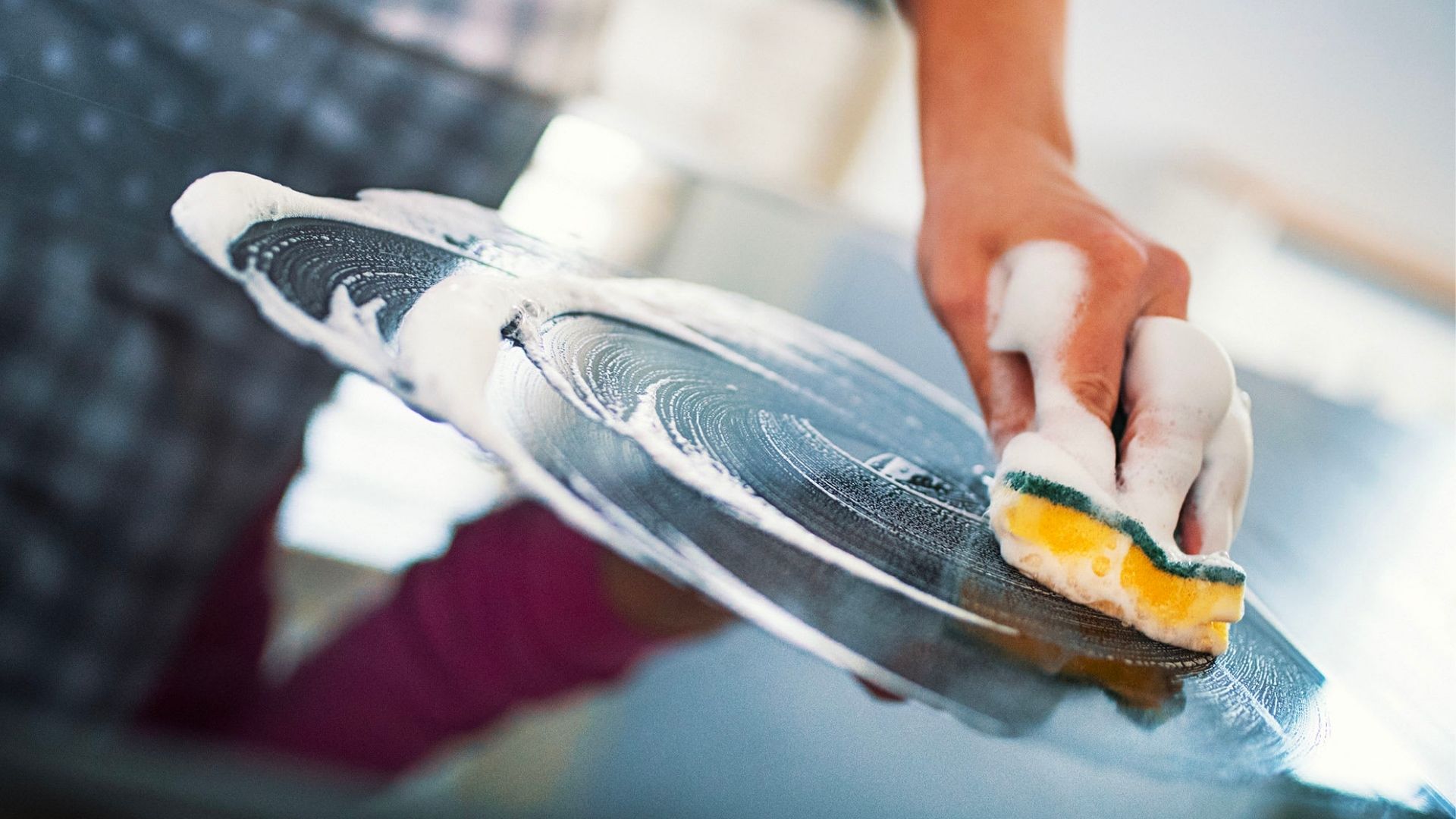When it comes to the heart of your home, few things make a statement quite like the elegant gleam of stone benchtops. These exquisite surfaces are not just functional; they’re works of art that deserve the utmost care and attention.
From the rugged charm of granite to the timeless allure of marble and the modern sophistication of quartz, each type of stone benchtop requires specialised care. No need to worry, though – armed with the right tools, techniques, and insights, you’ll be well on your way to ensuring these stunning surfaces remain the centrepiece of your home.
In the following sections, we’ll explore everything you need to know about cleaning, protecting, and restoring stone benchtops. Let’s dive in if you’re ready to elevate your stone benchtop care game to a new level of excellence.
Types of Stone Benchtops: A Comprehensive Overview
In the world of stone benchtops, diversity reigns supreme. Each type of stone has unique charm, character, and care requirements. Check out some of the most common stone types below:
1. Granite: Nature’s Rugged Elegance
With its exquisite blend of durability and aesthetics, granite has long been a staple in kitchens and bathrooms. Formed deep within the Earth’s crust, granite is known for its natural resilience to heat and scratches.
However, this doesn’t mean it’s immune to stains or etching. Regular sealing is paramount to preserve its beauty and integrity. Opt for a pH-neutral granite cleaner and steer clear of acidic or abrasive substances to ensure your granite benchtops continue to exude their rugged elegance.
2. Marble: Timeless Beauty in Veins
If sophistication and luxury are what you seek, marble is the epitome of timeless beauty. Its intricate veining patterns create a visual feast for the eyes, but marble is relatively porous and susceptible to staining.
Swiftly blotting spills and avoiding prolonged exposure to acidic liquids will help maintain its allure. Remember, a gentle touch is key; opt for a pH-neutral cleaner and steer clear of abrasive scouring pads to preserve the marble’s delicate charm.
3. Quartz: Modern Marvel of Engineering
Engineered quartz combines natural quartz crystals with resins to create a resilient, non-porous surface that’s visually stunning and low-maintenance. Its non-porous nature makes it highly resistant to staining, and regular soap and water are usually sufficient for routine cleaning. However, avoid excessive heat exposure and abrasive cleaners, which may compromise the surface’s integrity.
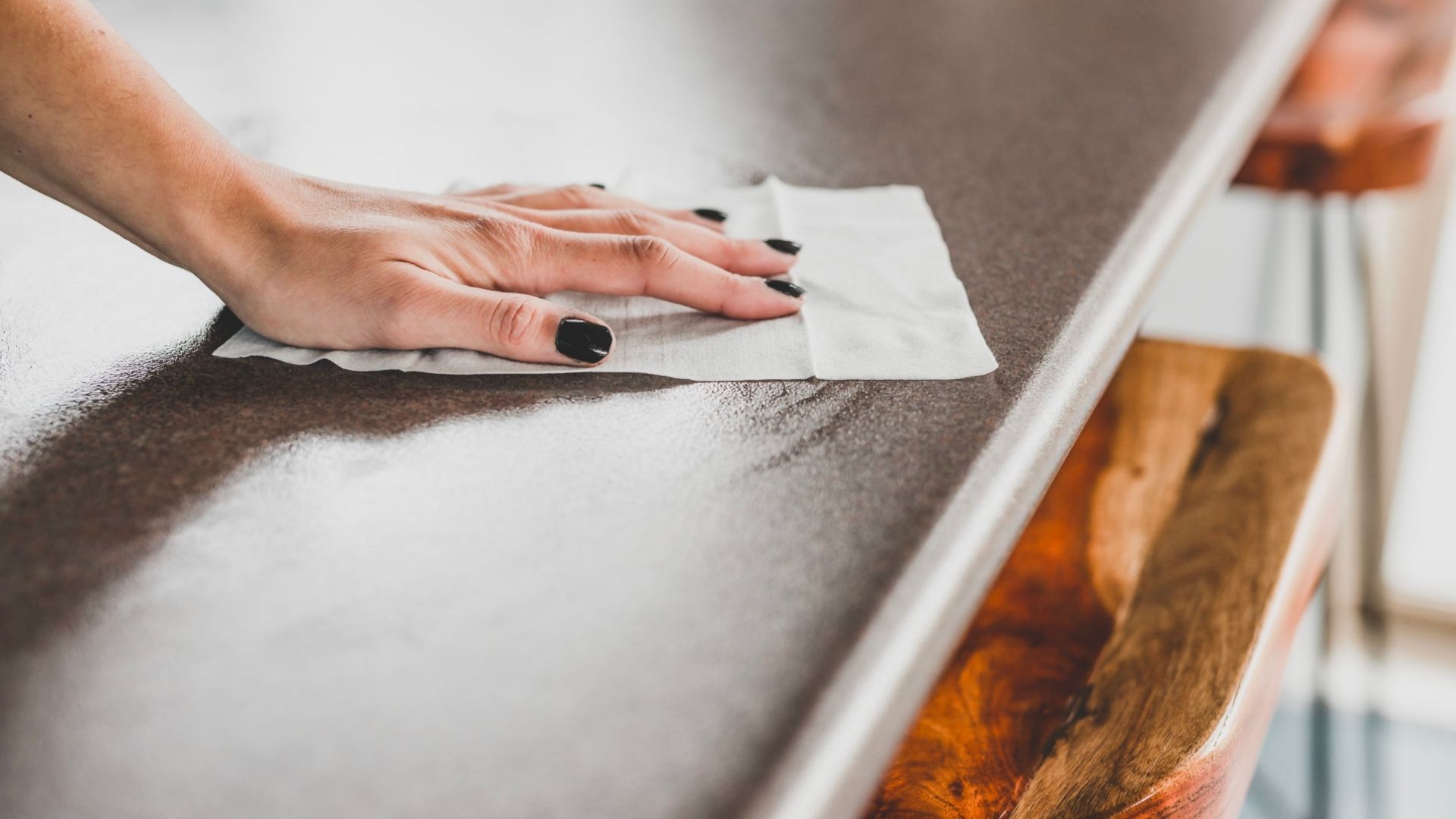
Essential Cleaning Tools for Stone Benchtop Care
The right cleaning tools can make all the difference in preserving the natural beauty of granite, marble, and quartz. Arm your cleaning kit with the following for the ultimate stone care.
1. Soft Microfiber Cloths: The Gentle Touch
A soft microfiber cloth is your first defence against dust, dirt, and spills. Its delicate fibres trap particles without scratching the surface, making it an ideal choice for regular wiping and maintenance. A gentle touch goes a long way in safeguarding your stone benchtop’s finish.
2. pH-Neutral Stone Cleaner: Gentle Power
pH-neutral stone cleaners are the unsung heroes of stone benchtop care. Specially formulated to cleanse without compromising the stone’s integrity, these cleaners effectively remove grime, oils, and stains. Their balanced composition ensures your benchtops remain spotless while preserving their natural beauty.
3. Non-Abrasive Sponge or Cloth: Soft Scrubbing
Opt for a non-abrasive sponge or cloth for stubborn stains or spills requiring a bit more effort. Pair it with your pH-neutral cleaner for soft scrubbing that removes residue without scratching the surface. Avoid abrasive scouring pads, as they can mar the beauty of your stone benchtops.
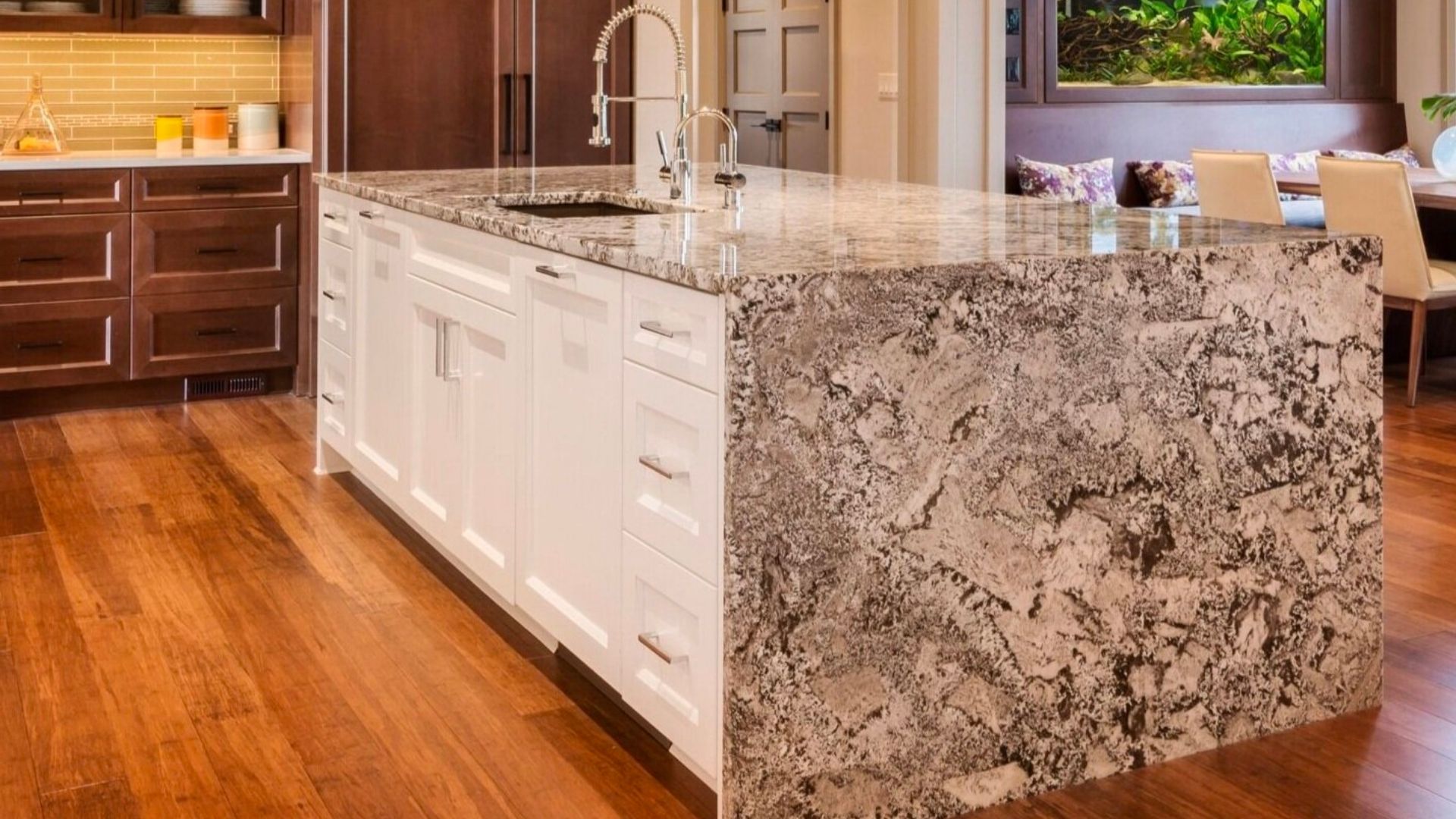
4. Chamois or Squeegee: Streak-Free Brilliance
After cleaning, a chamois or squeegee can be your secret weapon for achieving streak-free brilliance. Gently glide it over your stone surface to eliminate water spots and ensure a pristine finish. This step adds that extra touch of perfection to your benchtop’s appearance.
5. Stone-Specific Sealer: Shield of Protection
Regular sealing is vital for preserving the beauty and integrity of your stone benchtops. Invest in a high-quality stone-specific sealer recommended for your particular stone type. Applying the sealer according to the manufacturer’s instructions provides an invisible shield against stains and etching.
The Vital Role of Regular Sealing in Stone Maintenance
While incredibly resilient, the stone is not immune to the passage of time and the elements. It possesses microscopic pores that can trap liquids and particles, making it susceptible to stains, etching, and moisture damage.
Regular sealing creates an impermeable barrier, blocking substances from penetrating the surface and causing harm. This proactive measure is vital in high-traffic areas like kitchens and bathrooms, where spills and moisture are commonplace.
The Benefits of Regular Sealing
-
Protection Against Stains: Sealing forms an invisible shield that repels liquids, preventing them from seeping into the stone. This protection is especially valuable for porous stones like marble, ensuring they remain free from unsightly blemishes.
-
Resistance to Etching: Acidic substances, such as citrus juices and vinegar, can etch the surface of marble and other calcareous stones. Sealing acts as a buffer, reducing the risk of etching and preserving your stone’s pristine finish.
-
Longevity and Durability: Just as a coat of varnish preserves a painting, regular sealing enhances the durability of your stone benchtops. It guards against wear and tear, maintaining its exquisite appearance over time.
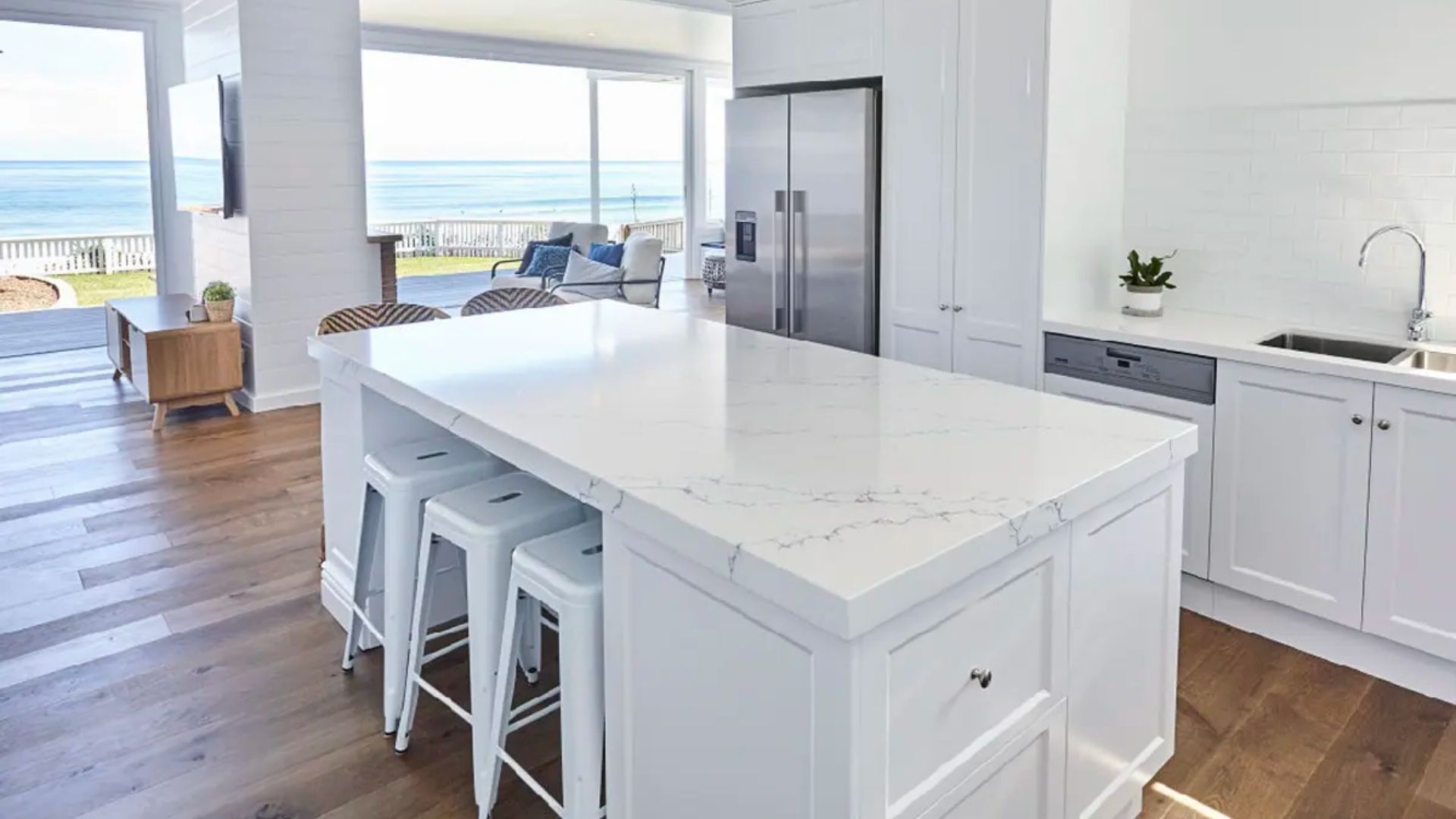
When and How to Seal Your Stone Benchtops
The timing of sealing depends on the type of stone and its usage. As a general rule, granite and marble should be sealed every 1 to 3 years, while quartz may not require sealing due to its non-porous nature.
Before sealing, ensure your benchtop is clean and dry. Apply a stone-specific sealer using a clean cloth or applicator, following the manufacturer’s instructions. Allow the sealer to penetrate for the recommended time, then wipe off any excess. Once the sealer cures, your benchtop will be fortified against the challenges of daily life.
Preventing Stains and Etching: Expert Strategies
The age-old adage holds true: prevention is better than cure. Address spills promptly by blotting them with a soft, absorbent cloth. Avoid wiping, as this can spread the spill and potentially force it into the stone’s pores. Swift action minimises the likelihood of staining, preserving your benchtop’s flawless appearance.
Acidic substances like citrus juices, vinegar, and certain cleaning products can trouble your stone benchtops. When using these items, exercise caution and avoid direct contact with the stone surface.
If contact occurs, rinse the area with water to mitigate potential etching. Prevention is your strongest ally against this particular challenge. While stone is durable, it’s not impervious to scratches and damage from sharp objects.
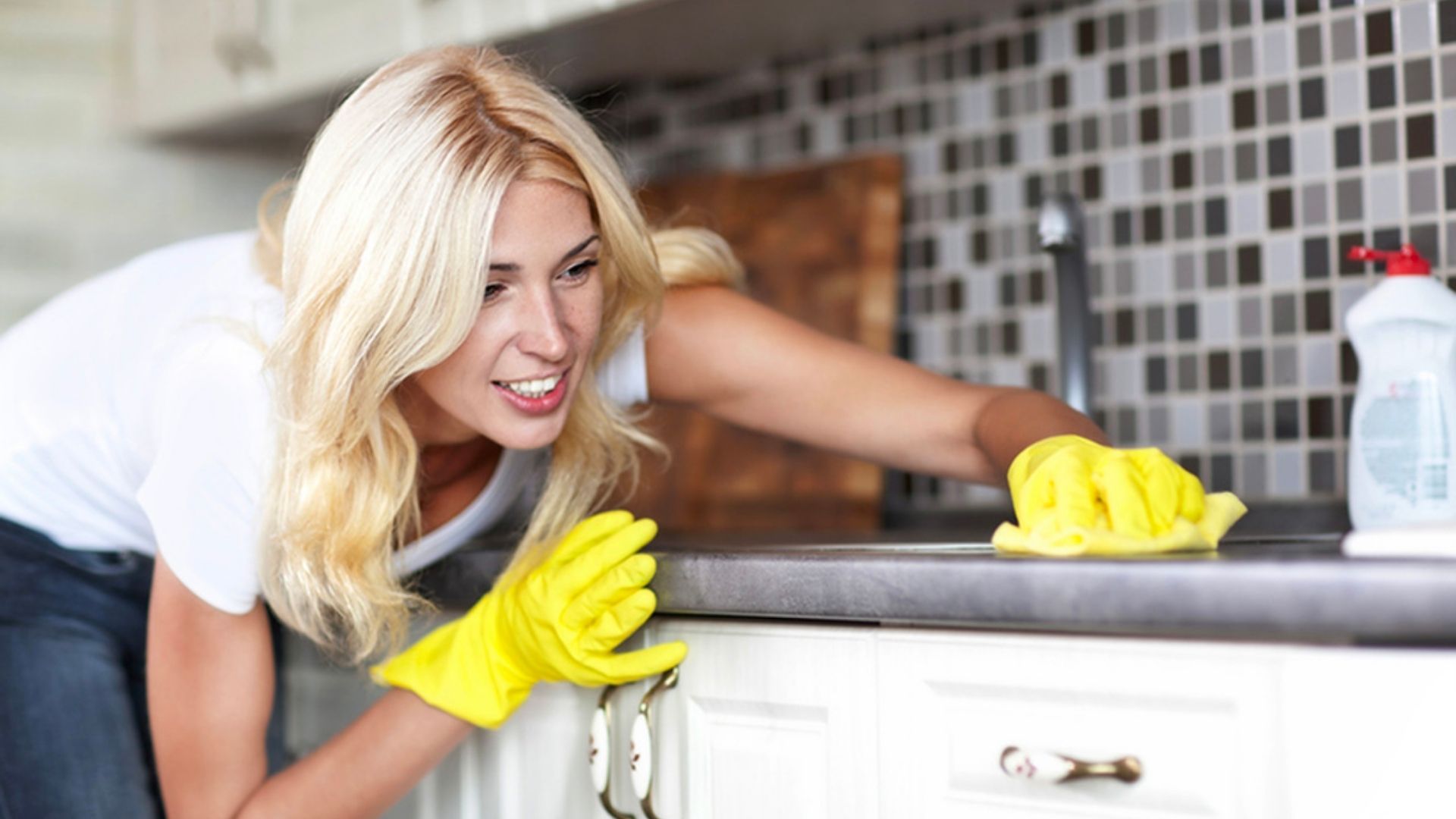
Use cutting boards for food preparation and trivets for hot cookware to protect your benchtops. These simple additions create a barrier between potential threats and your stone’s surface, preserving its integrity and aesthetics.
Opt for a pH-neutral stone cleaner and a non-abrasive sponge or cloth when dealing with spills or everyday cleaning. Avoid abrasive scouring pads, as they can lead to scratches and compromise the stone’s resilience.
Regular sealing plays a significant role in preventing stains and etching. By creating an impermeable barrier, sealing guards against substances that could otherwise harm your benchtops. It’s a proactive measure that forms your stone care arsenal’s first line of defence.
Restoring the Natural Gleam: Proven Techniques
Polishing is a delicate dance that requires finesse and precision. For marble and granite, a specialised stone polishing powder can work wonders. Mix the powder with water to create a slurry, then apply it to the stone surface.
Gently buff with a soft cloth or a low-speed polisher, focusing on dull or worn areas. The result? A rejuvenated surface that showcases the stone’s innate beauty.
Minor scratches and imperfections can be erased through surface restoration. Clean the area with a pH-neutral stone cleaner and a non-abrasive sponge. For marble, apply a marble polishing compound and work it into the surface using a clean cloth.
Buff the area until the blemish is no longer visible. For deeper scratches, consider seeking professional assistance to ensure optimal results. Honing is an excellent technique for achieving a soft, matte finish on your stone benchtops.
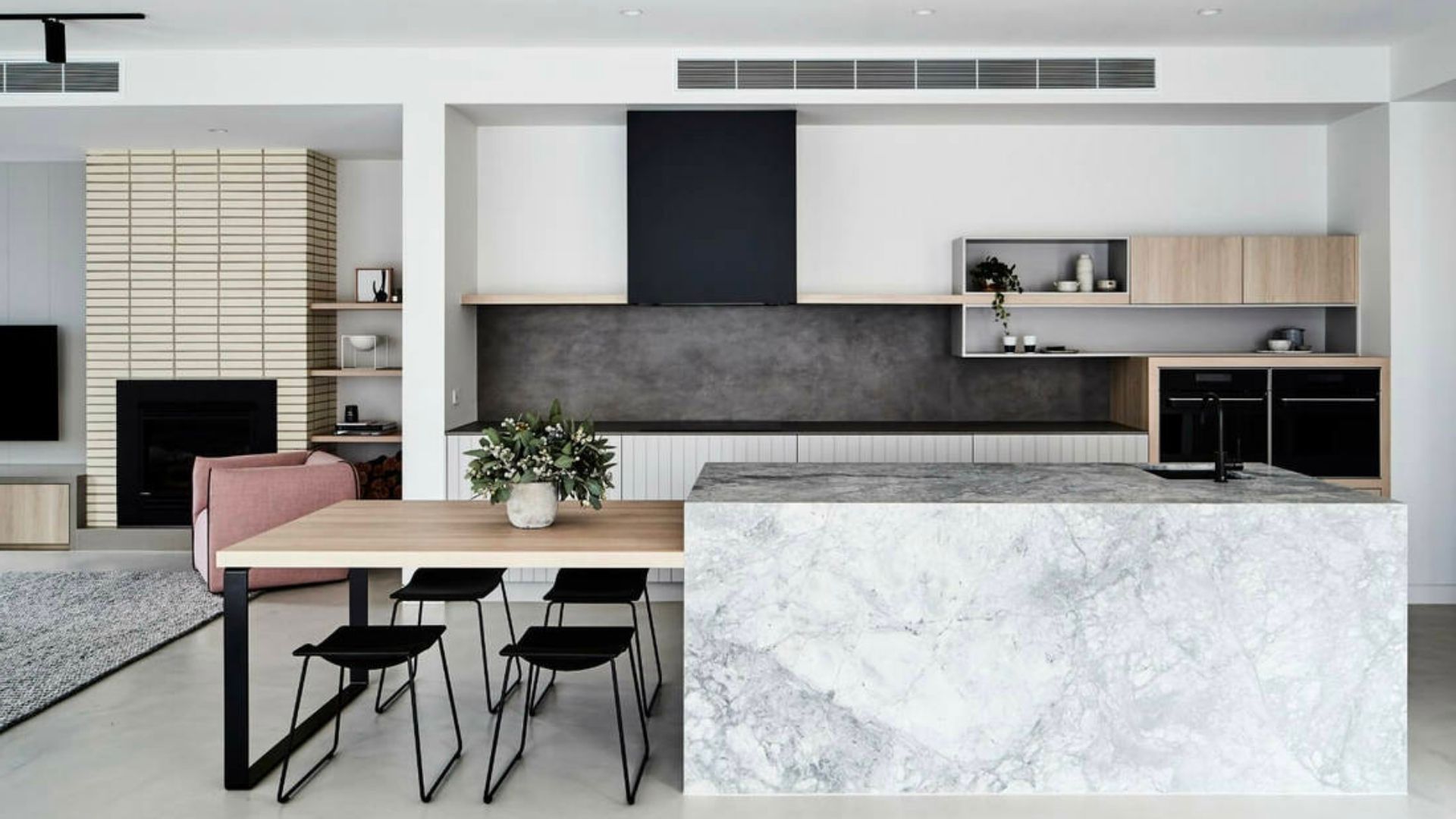
It involves gently abrading the surface to create a consistent texture. Use a fine-grit diamond honing pad and water for marble or limestone to achieve the desired effect. Quartz surfaces can benefit from a similar approach, providing a uniform matte appearance.
For extensive damage or restoration needs, enlisting the expertise of a professional is a prudent choice. Trained specialists possess the tools and experience to assess the condition of your benchtops and implement advanced techniques.
Whether repairing cracks, addressing deep etching, or revitalising worn areas, a professional touch can restore your stone benchtops to their original splendour.
Dos and Dont’s When Caring for Your Stone Benchtops
Dos:
-
Do Regular Cleaning: Regularly wipe down your benchtops with a soft microfiber cloth and a pH-neutral stone cleaner. This proactive step prevents the buildup of dirt and maintains their exquisite appearance.
-
Do Swift Spill Response: Promptly blot spills to prevent staining. Use a gentle, absorbent cloth and avoid wiping to contain and lift the spill.
-
Do Use Cutting Boards and Trivets: Protect your benchtops from scratches and heat using cutting boards for food preparation and trivets for hot cookware.
-
Do Regular Sealing: Follow a regular sealing schedule to safeguard against stains and moisture damage. Sealing forms a protective barrier that preserves your benchtops’ integrity.
-
Do Professional Restoration: Consult professionals for expert restoration when in doubt or facing extensive damage. Their experience and tools can work wonders in revitalising your stone surfaces.
Don’ts: Navigating Stone Care Pitfalls
-
Don’t Use Abrasive Cleaners: Avoid harsh chemicals and abrasive scouring pads, as they can scratch and compromise the surface of your benchtops.
-
Don’t Allow Acidic Substances: Prevent contact with acidic substances like citrus juices and vinegar. These can lead to etching and diminish the lustre of your stone surfaces.
-
Don’t Drag Heavy Objects: Lift, don’t drag heavy objects across your benchtops. This prevents scratches and maintains their flawless finish.
-
Don’t Ignore Regular Maintenance: Consistency is key. Neglecting regular maintenance can lead to the gradual deterioration of your benchtops’ beauty and resilience.
-
Don’t Overlook Professional Advice: When in doubt, seek guidance from stone care professionals. Their insights can help you make the best decisions for your benchtops’ care.
Elevate Your Stone Benchtop Care Experience
Are you ready to embark on a journey of stone benchtop excellence? Don’t wait to take the next step. Whether you have questions, want to seek personalised guidance, or wish to witness our expertise firsthand, we invite you to reach out to us.
Call now to schedule your free demonstration and experience the art of stone benchtop care in action. Let’s work together to ensure your stone benchtops continue to shine with lasting beauty, making a statement that stands the test of time.

